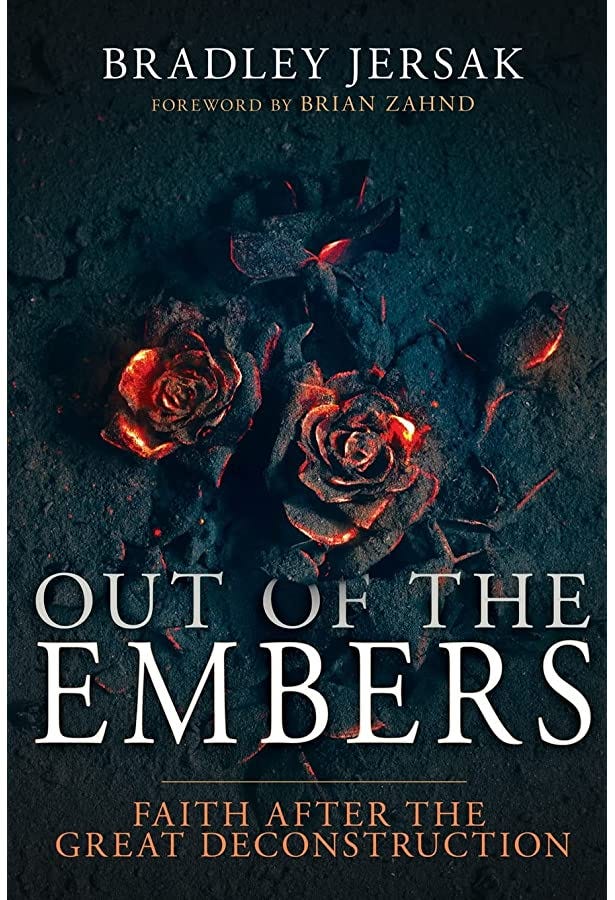Out of the Embers
By Brandon Brown
In his foreword to Bradley Jersak's Out of the Embers, Brian Zahnd writes, "North America has experienced two episodes of Christian revival known as Great Awakenings—the first in the eighteenth century, the second in the nineteenth century. Both produced a remarkable increase in church membership. ... But now, in the early twenty-first century, the church in North America is experiencing a precipitous decline—a mass exodus that Bradley Jersak has aptly dubbed 'the Great Deconstruction.'" There are many reasons for the decline that Zahnd mentions and many discussions of why the U.S. has lagged other wealthy Western nations in our decline in church involvement. The "Great Deconstruction" as Jersak calls this decline, is treated with both vilification and celebration, but it is more complex than a simplistic either or and Out of the Embers deals very well with this complexity.
Like Brian Zahnd's When Everything's on Fire, Out of the Embers has both general and personal elements to the discussion and story within the book. Unlike Zahnd's personal story, Jersak's "deconstruction" had more trauma elements than did Zahnd's and thus Jersak deals with the possibility of pain and trauma through any experience like a deconstruction of faith. Jersak states, "Deconstruction happens. It is inevitable. It is necessary. Again, it can be pure joy—the good news in the most profound ways. It can also be pure sorrow—a cataclysmic collapse. Or the joy and sorrow can flow mingled down, like the water and blood from the Savior’s side." While deconstruction often leads to positive outcomes, not everyone experiences deconstruction is the same way, nor should they. Deconstruction is not a process which can be easily repeatable with lists like "Five Ways to Have a Positive Deconstruction." Jersak is very clear that the role of anyone walking with the deconstructing is not enforcing a response or experience upon the one deconstructing. "We cannot and must not superimpose our unique experiences on others to minimize their stories of genuine spiritual abuse or to diminish the joy they feel after a prison break from religious bondage." This is one of the most important take aways from Out of the Embers. It is not our place to enforce a particular response to a person experiencing deconstruction.
The book is structured in three major sections. First is an introduction to the "great deconstruction" and includes Jersak's own story of trauma and those of others. This is a deeply personal section that tells the story of multiple ways humans are experiencing deconstruction of faith. Section two is a rich dialogue with seven philosophers and some dialogue with ancient faith from Moses to John of the Cross. The seven philosophers include Plato, Voltaire, Nietzsche, Kierkegaard, Dostoevsky, and Jersak's favorite who factors throughout the book Simone Weil. The last section deals with how we live in the reality of a deconstructed faith and ways to find faith out of the embers of deconstruction. The section of dialogue with philosophers is rich and deep. Like Zahnd, who deals with Nietzsche, Kierkegaard, and Dostoevsky in When Everything's on Fire, Jersak digs into the depth of philosophical critiques of Christendom, which are incredibly relevant for the post and meta modern phenomenon of the "great deconstruction." Jersak spends more time with the philosophers than Zahnd, but his purpose with the philosophers is more involved than Zahnd's as well. But in that vein, I view the two authors' books as complementary as they cooperate in explaining and providing possible paths for hope in deconstruction.
Zahnd contrasts the two great Awakenings to the "Great Deconstruction" in the preface to Out of the Embers but it is my opinion that the "Great Deconstruction" is itself a revival. This is a call to the church to return to our first love of Jesus and begin living as radical disciples as we reject the syncretic nature of much of modern Western evangelicalism. Rather than vilifying those experiencing deconstruction, the church should listen to their cries of lament for a people not living as their example and Lord. This is another must read for pastors and any serious Christian.
For my review of When Everything's on Fire go here.



